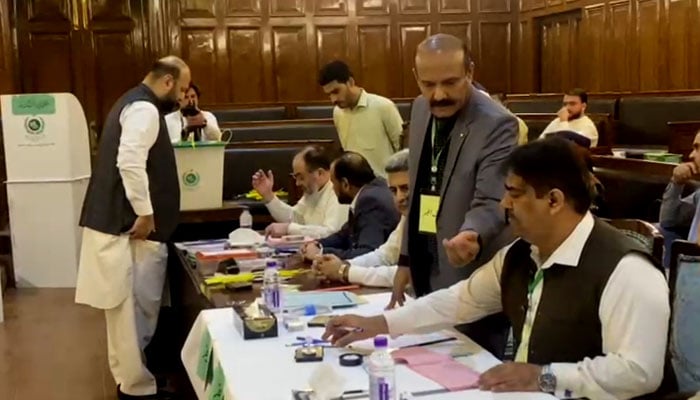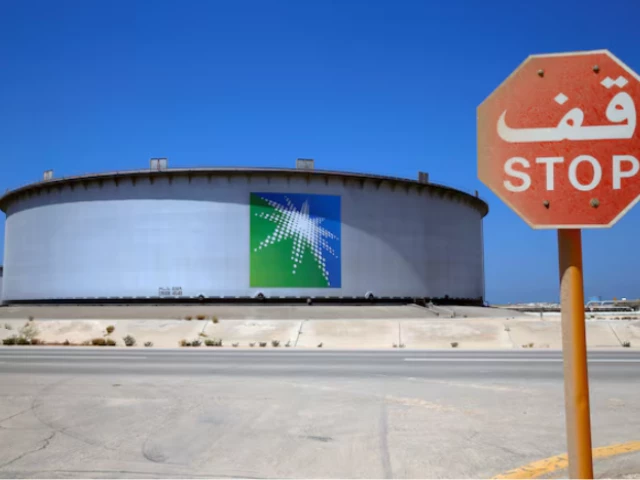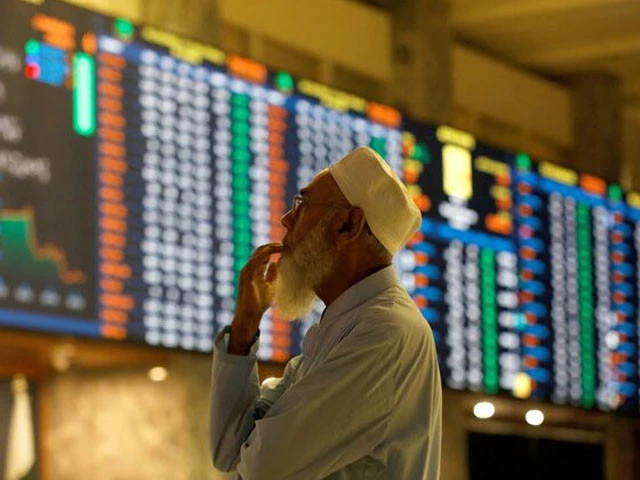PESHAWAR: The polling to elect 11 senators to the Upper House has commenced in the Khyber Pakhtunkhwa Assembly with the ruling Pakistan Tehreek-e-Insaf (PTI) and the opposition having agreed on a seat-sharing arrangement.
The polling, which began at 11am on Monday, will continue till 4pm, according to the Election Commission of Pakistan.
The voting is underway in Jirga Hall of KP Assembly which has been declared polling station by the ECP.
Earlier, Khyber Pakhtunkhwa Chief Minister Ali Amin Gandapur had succeeded in persuading four disgruntled members of his party to withdraw from today’s Senate elections.
The last-minute breakthrough came after a series of late-night meetings between the chief minister and the dissident lawmakers, which reportedly continued past midnight.
The swearing-in ceremony of KP reserved seats MPAs on Sunday has cleared the path for the long-delayed Senate elections.
The contest is taking place on seven general seats, alongside two reserved seats each for women and technocrats.
Understanding Senate elections
To contest a Senate seat, candidates must be Pakistani citizens, and registered voters of the province or region they are contesting from. They must also meet the qualifications laid out under Article 62 of the Constitution, which includes criteria relating to character, integrity and financial standing.
Unlike general elections, where the “first past the post” system is used (meaning the candidate with the most votes wins), the Senate elections are held through a proportional representation system known as the single transferable vote. This method is designed to reflect the strength of each party in the respective assembly more accurately.
Under this system, voters rank candidates in order of preference. If a candidate secures more votes than required, surplus votes are transferred according to second preferences. If no candidate meets the threshold, the one with the fewest votes is eliminated and their votes are redistributed. This continues until all seats are filled.
How many votes required?
Voting for Senate polls is currently underway under the supervision of the Election Commission of Pakistan (ECP), with each MPA allowed to cast three votes. A white ballot paper will be used for general seats, green for technocrat seats, and pink for women’s seats.
To secure one of the seven general seats, a candidate will need at least 19 votes. For the reserved seats, candidates must secure 49 votes each.
In a rare display of mutual understanding, the provincial government led by PTI and the opposition have jointly fielded 11 candidates — six backed by the ruling side and five by opposition parties.
The government currently enjoys the support of 92 MPAs in the Khyber Pakhtunkhwa Assembly, while the opposition bloc has the backing of 53 members.
The opposition is aiming to clinch three of the seven general seats but will need at least four additional votes to secure the third one.
Meanwhile, out of five PTI dissident members who had originally filed nomination papers, four have withdrawn from the contest. As a result, Khurram Zeeshan remains the only dissident candidate still in the running for a general seat.
According to parliamentary sources, seven panels are being formed today for the general seats. Among these, one panel will be unique as it will consist of members from both the government and the opposition. This panel will support PPP candidate Senator Talha Mahmood. Currently, Talha Mahmood has only 15 votes from the opposition, but with the government providing five additional votes, his success can be ensured, according to The News.
The government needs 76 votes to elect its four senators. After achieving this, it will have around 16 votes remaining. Sources say that five of these votes will be given to Talha Mahmood, which could become the biggest turning point of this election.
Sources revealed that out of the seven panels, four are for government candidates and two for the opposition, but Talha Mahmood’s panel will be the only one formed with the joint cooperation of both government and opposition members. It has also been revealed that members whose loyalty is in doubt will not be included in Mirza Afridi’s panel. Those opposing Ali Amin Gandapur will be placed in the panel of PTI’s ideological leader Murad Saeed to prevent them from voting for any other candidate.
Candidates in run
A total of 25 candidates are contesting the Senate elections from Khyber Pakhtunkhwa (KP).
On the general seats, the government has fielded four candidates, while three have been nominated by the opposition. For the reserved seats — two for women and two for technocrats — both the government and the opposition have nominated two candidates each.
The PTI has named Murad Saeed, Faisal Javed, Mirza Mohammad Afridi, and Noorul Haq Qadri. Robina Naz and Azam Swati are also in the running under the PTI banner.
Opposition candidates include Niaz Ahmad from the Pakistan Muslim League-Nawaz (PML-N), Talha Mahmood from the Pakistan Peoples Party (PPP), and Atta-ul-Haq from Jamiat Ulema-e-Islam (JUI-F) on the general seats.
On the reserved seats, PPP has nominated Rubina Khalid, while JUI-F’s Dilawar Khan is also contesting.
Meanwhile, the oath of the newly elected members of the reserved seats has been challenged in the Peshawar High Court (PHC) by Chief Minister Ali Amin Gandapur and Speaker Babar Saleem Swati.
The petition comes a day after KP Governor Faisal Karim Kundi administered the oath to 25 opposition’s reserved seats MPAs — including 21 women and four minority members — in compliance with the PHC orders.
The opposition MPAs had approached PHC, urging the chief justice to nominate an authority to oversee the oath-taking process after KP Assembly speaker adjourned the session due to a lack of quorum.
Naming the governor, the federal government, the PHC registrar and the ECP as parties to the case, the plea maintains that the assembly session had commenced on Sunday but was adjourned by the speaker due to the lack of quorum




